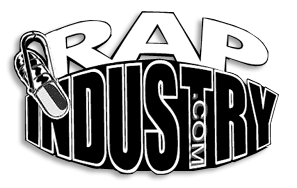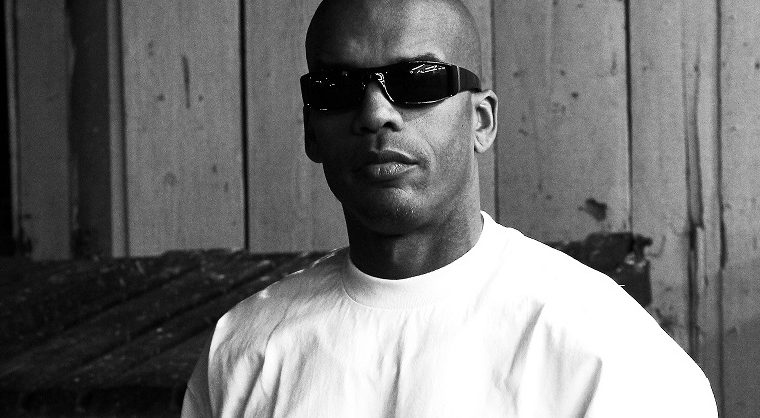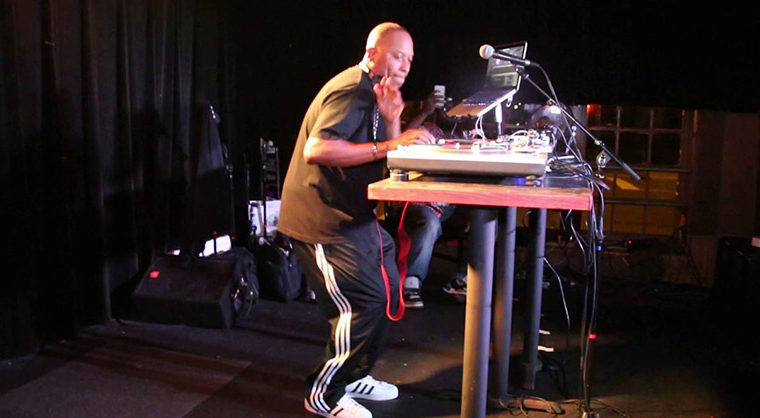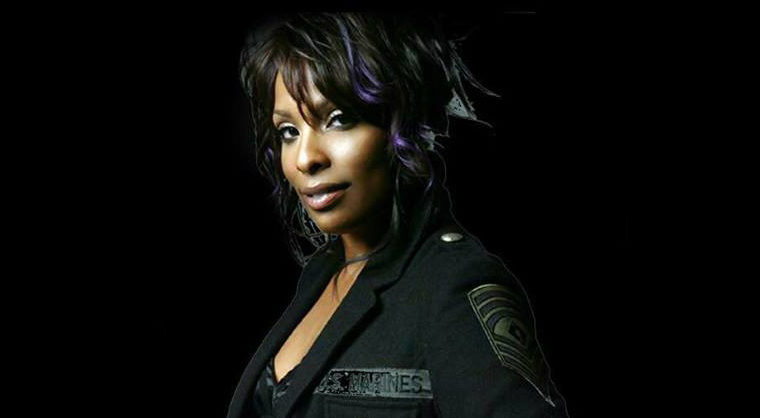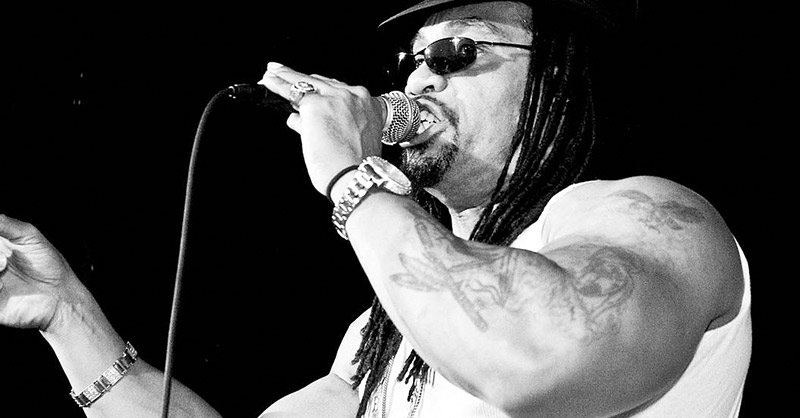
by: Sam Frank
Rapindustry.com
Melle Mel began performing in the late 1970s. He may be the first rapper to call himself MC (master of ceremonies). Other Furious Five members included his brother Kid Creole (Nathaniel Glover), Scorpio (Eddie Morris), Rahiem (Guy Todd Williams) and Cowboy (Keith Wiggins). While a member of the group, Cowboy created the term hip-hop while teasing a friend who had just joined the US Army, by scat singing the words “hip/hop/hip/hop” in a way that mimicked the rhythmic cadence of marching soldiers.
Grandmaster Flash & The Furious Five began recording for Enjoy Records and released “Superrappin'” in 1979. They later moved on to Sugar Hill Records and were popular on the R&B charts with party songs like “Freedom” and “The Birthday Party”. They released numerous singles, gaining a gold disc for “Freedom,” and touring. In 1982 Melle Mel began to turn to more socially-aware subject matter, in particular the Reagan administration’s economic (Reaganomics) and drug policies, and their effect on the black community. A song “The Message” became an instant classic and one of the first glimmers of conscious hip-hop. Mel recorded a rap over session musician Duke Bootee’s instrumental track “The Jungle”. Some of Mel’s lyrics on “The Message” were taken directly from “Superrappin'”.
Mel became known as Grandmaster Melle Mel and the leader of the Furious Five. The group went on to produce the anti-drug song “White Lines (Don’t Don’t Do It)”. An unofficial music video starred up-and-coming actor Laurence Fishburne and was directed by then-unknown film student Spike Lee). The record was falsely credited to “Grandmaster + Melle Mel” by Sugar Hill Records in order to fool the public into thinking Grandmaster Flash had participated on the record.
Mel gained greater fame and success after appearing in the movie Beat Street, with a song based on the movie’s title. He performed a memorable rap on Chaka Khan’s smash hit song “I Feel for You” which introduced hip hop to a wider and more mainstream R&B audience. Grandmaster Melle Mel & The Furious Five had further hits with “Step Off”, “Pump Me Up”, “King of the Streets”, “Jesse”, and “Vice”, the latter being released on the soundtrack to the TV show Miami Vice. “Jesse” was a highly political song which urged people to vote for then presidential candidate Jesse Jackson.
See what’s inside the mind of one of the great Pioneers of rap … Enjoy!
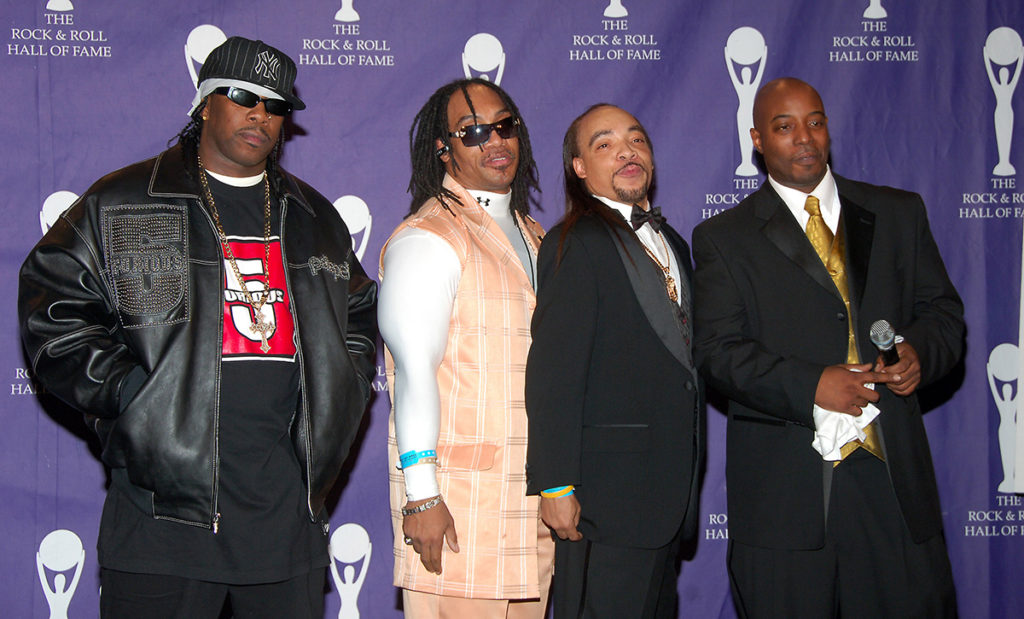
INTERVIEW:
Congratulations on the Rock’N’Roll Hall of Fame.
Melle Mel: Thank you. It was definitely a blessing.
Are you guys performing there?
Melle Mel: Yeah, we gonna definitely perform.
Everyone in the Furious Five?
Melle Mel: Yes, minus Cowboy, of course, he died, but everyone will be there in spirit.
When was the last time the remaining members performed together?
Melle Mel: The VH-1 Hip Hop honors held about two years ago.
Are you guys cool with each other? Is it like, hey, haven’t seen you in a while or lets just get this done?
Melle Mel: I think it’s more of something for the people. We are going in the Rock’N’Roll Hall of Fame to represent exactly who we are and what we did. To have personal goals so that if you have anybody in the Rock’N’Roll Hall of Fame that think we ain’t worthy to be in the Rock’N’Roll Hall of Fame I think we should do something to prove that us, as well as Hip Hop, does belong in the Rock’N’Roll Hall of Fame.
If it wasn’t for you guys, people like 50 Cent wouldn’t be around. That’s a big accomplishment. When I lived in Japan everybody was all about the real old school, true Hip Hop, and your name came up a lot.
Melle Mel: In Japan, its more culture driven. All of Europe is also more culture driven. The break dancing, graffiti, the Deejaying, and the real old school style of dress like the pumas and the fat laces, they are into it from the aspect of really embracing the culture. We got a lot of fans over there. It’s all love.
They definitely know who you. I also wanted to congratulate you on your new album, Muscles.
Melle Mel: It’s definitely a good album. The guys who reviewed said it was a great album. There’s no features because I’m trying to establish Melle Mel as an artist and as a brand name; Muscles, so we just go with me on every song, me in the video, just to establish what we do instead of having an outside artist come in and authenticate what I’m doing.
I hear a lot of people saying that if an artist has 10 or more guest spots on an album, then it means that they can’t sell it themselves. So, by doing it yourself is a real test of what Melle Mel is capable of.
Melle Mel: That’s what I’m trying to establish. It’s a gamble, and I think it takes a lot of balls to do it, but I’m gonna do it because I really believe I gotta establish myself as being able to stand on my own and not rely on anyone to make a hit on my album.
What age groups are you aiming for with Muscles? If you’re singing in the older school style do you think it work with audiences who listen to artists like Rich Boy?
Melle Mel: Actually, the album would work for any age range because Hip Hop music is always going to be Hip Hop music. It doesn’t change. Some of the songs are for my core audience, and some of the songs are for the next audience. It’s a pretty well-rounded album.
That sounds awesome. I’m just gonna get a little sidetracked here, but how much do you lift on the bench press?
Melle Mel: Well, I got a body builder’s physique so I look bigger than what my strength is, and in order for bodybuilding you don’t really have to lift very heavy. I’m pretty strong for my size, but I could bench about 315 lbs. and I could squat about four or five hundred lbs. and I can dead lift about four or five hundred lbs.
Wow, I go to the gym all the time and you can easily double what I do, but I heard you were looking to wrestle Jon Cena from WWE.
Melle Mel: I think Jon Cena would make a good tag team partner. I’m more like a Shawn Michaels or Rey Mysterio Jr. kinda guy.
You’re a high flyer!?!
Melle Mel: I think they would be my best competition.
Am I going to be looking for you as the next Intercontinental Champion?
Melle Mel: Most definitely. You see, with Jon Cena, me and him would be good friends ‘till I flip on him a year and half from now. We’d be tag team partners then one day, out of the blue, I would flip on him, ya know, hit him upside the head in the middle of the ring or something.
You would take it flipmode in front of Vince McMahon. I’m a big wrestling fan, so when I heard that you were looking to get in the WWE and I saw your size I thought to myself that you could totally do it.
Melle Mel: For the WWE, I’m shorter than the average guy, but I seen Jon Cena over the weekend because Arnold Schwarzengger gave a big body building show and expo out in Columbus Ohio so we all was out there and Jon Cena has an endorsement with a supplement company so he was there signing autographs. He is probably a bit taller than me, but as far as size-wise, we’re about the same size and thickness. It’s definitely going to be something great for Hip Hop and a big story.
Do you think that if you did WWE and became successful at it would you go into movies under the WWE moniker?
Melle Mel: Sure. I never really thought of myself as a good actor. The kinda movies I would like to be are the cheesy martial arts movies where I would be the bad guy. I don’t have no visions of being an actor or sayin a whole lotta lines. Just say something corny and get killed by the end of the movie. Ya know, make it easy on me.
You’d be a scary bad guy. You’re believable.
Melle Mel: Yeah, that’s what I’m sayin. It’s easy that way, maybe if Jackie Chan kicks me off a building in the middle of the movie, I’m good.
Nothing complicated. That’s awesome. What made you even think about wrestling? Was it your physique or were you thinking all of a sudden that you wanted to try something different?
Melle Mel: I always liked wrestling, even when Hulk Hogan was wrestling, but the thing that made it crystal clear years ago was when they signed Scottie Too Hottie and Grandmaster Sexy. People was like, “Yo, Melle Mel, you should be doing that.” They came in the ring with doo-rags and I used to wear a doo-rag all the time; but what solidified it was Jon Cena, when he came in the ring and started rapping. And when those fans liked rapping, I thought to myself if they like Jon Cena, then those same fans know who I am. If you like Rap and you know who Rap is, if nothing else, you know my music so if I go in the middle of a WWE arena and say “don’t push me ‘cause I’m close to the edge,” the whole audience will scream out, ‘I’m tryin not to lose my head” because they know me.
That would be your catch phrase, “Don’t push me!”
Melle Mel: But the WWE don’t know [fans] know me. That’s the whole hurdle. They let anybody wrestle, but they don’t let everybody wrestle. They let Kevin Federline beat Jon Cena, so that’s what the whole thing is. If he could do it, I definitely can do it. We just gotta get the business down, dot the “i”s and cross the “t”s, get myself in a little better shape and we good.
What do you think of Hip Hop now? Do you feel that these new artists are just flaunting their cash or are they really saying something?
Melle Mel: I think as a business it’s great. As a culture it once was there’s nothing like that now. Nas saying that Hip Hop is dead is 100 percent right. The culture it once was and the music it could be is no where near that now because artists nowadays are not hip hop culture minded, they are just a lot of street cats that took a lot of their skills from being on the streets and just brought it into the music. There are a lot of things that really involve Hip Hop, or Hip Hop based that should be paid more attention to, but they left that all out of the equation. Entertainment, stage presence, and being nice to people. Like making an album without using all the features. That has changed to game so drastically. It makes for good business, but it don’t make for good entertainment, and it don’t help Hip Hop as a culture one iota.
Producers now have taken on a new role in the way albums are made as opposed to the way they were made in the early 80s.
Melle Mel: In most cases, the producer makes more money than the artist because they pay a producer so much to make a track, a lot of times [artists] don’t make that money back.
Do you have any special producers on Muscles?
Melle Mel: For the most part I worked with a guy called Joey Malloy, but he’s the original Romeo J.D. from The Boogie Boys, The Heat Makers did one, and my man Tony Lopez, out of Westchester County, a young cat, he did one.
Did you recruit these guys?
Melle Mel: I was always in the studio doing tracks I had for years. It was just the process me taking some of the stuff I had in the can, and then when we realized we were going to do a full blown album, I just finished the rest of the stuff.
What was the album you made before Muscles?
Melle Mel: I made an album with one of my brothers from the west coast, Rondo. We made an album together. We didn’t really have a way to promote it or the money to promote it.
When you worked with a west coast artist did your style change?
Melle Mel: No, It stayed the same. Working with him I had to do different things. I didn’t do everything I would want to do on my own because you working with another artist, but he’s a real talented dude, so there were no creative problems. It would have been a great album if we had the money to promote it.
That’s a shame. There’s a lot of good music out there, but if its not promoted correctly and people don’t hear it, then people are only left with is what’s playing on the radio.
Melle Mel: Well, there’s one thing about rap right now, the talent has very little to do with what it takes to make a successful record. It used to be talent. That was the main thing you needed to have. Now you don’t need that.
What year do you think that changed? Was it around the time of Eric B. and Rakim?
Melle Mel: If you were to have the evolutionary scale, the era of Rakim was the last great era in Rap. The era when Rakim was out Big Daddy Kane was out, Kool G Rap was around then, you know, some real great rappers were around then. Actually, [things changed] even with the Sugar Hill Gang. There were good rappers before they came out, but if you were to ask any rapper at that time, we all hated it. Rap was destined to go down hill once they started making records because it didn’t take the kind of talent to make a rap record that it took to be a real rapper.
How do you define a good rapper?
Melle Mel: A good rapper should be able to rhyme about anything. I’m not saying you have to rap off the top of your head, but you should be able to put a rhyme together and write about anything, and be good at it. You should be able to work any beat. Right now, you don’t have to have a great skill level to actually do it. During Run DMC’s era, with groups like The Fat Boys, the more commercial it got the more the talent level went down hill. It took less and less of a great rapper to do it. That’s why the New York rap scene is dead because you have good rappers, but they’re trying to follow everyone else’s blueprints. So you have great rappers that don’t know what to rap about so they’re trying to go hard like everyone else instead of just trying to keep it with the flavor, the good metaphors, and the punch lines.
Where do you find a middle ground to make a living with commercial, as opposed to the way you want to rap which you know is superior to what is selling? That’s kind of a hard grey area.
Melle Mel: Yeah, especially when the industry spoon fed the public not to really understand what a Master Rapper is. Everything is just the hooks on the record, the hot beat, it really don’t have anything to do with rapping. You could almost say anything on a record and people ain’t listening that hard to hear it. It’s hard to be a good rapper because [audiences are] conditioned not to hear good rap.
Have you ever thought about doing your own radio show on satellite radio?
Melle Mel: We tried to do that with Sirius radio when it first came out, but who knows, we might have a better shot now since Sirius and XM merged. We are trying to bring Hip Hop along and make it mature so that would be one of the elements we’d have to add so we could get our music played and get our agenda across to people.
I would definitely tune into that. Who do you listen to? Do you have an Mp3 play you use?
Melle Mel: I listen to Rap only when I’m in the club. And when I’m in the street I just hear what people are playing in the street just to survey what’s coming out of people’s cars. I try to create music so I don’t listen to other people’s music because I don’t want their music in my head. I want to create from an original standpoint.
Do you have children?
Melle Mel: Yeah, I have seven kids.
Wow, do you know what kind of music they listen to?
Melle Mel: My kids listen to the music from now. They’re crazy.
Where did you grow up in New York?
Melle Mel: South Bronx in New York.
What was the first Hip Hop record you heard and thought was cool?
Melle Mel: They didn’t make records actually. The Sugar Hill Gang, on their album, used a record called Sugar Hill Groove. They used one of the old breakbeats and I thought that was a good record, but they didn’t put that record out, but that was the first record I thought was cool.
When you were touring in the 80’s did you ever battle against other rappers?
Melle Mel: Not me personally, we always went against other groups. When The Furious Five was doing it we had a reputation that was so strong not many groups went up against us so there was no competition. Our battles were after we made records and went on the road we would do shows with groups like The O’Jays and The Commodores to see if we measured up.
